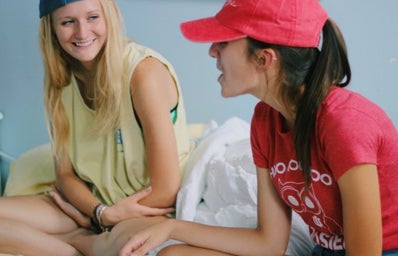Almost every industry is male-dominated, but especially those that revolve around science, technology, engineering and mathematics (STEM). Women who enter careers around these subjects are no stranger to being the minority in their classes or work environments. These situations can feel anywhere from daunting to empowering. Her Campus at UCLA surveyed college women in the University of Georgia Society of Women Engineers to learn more about their experiences.
Layla Parsa is a junior and is currently studying mechanical engineering with a minor in business. Parsa is pursuing a career in construction and says when asked if she had ever faced discouraging or discriminatory comments in a classroom or professional setting, she said, “Yes. As much as environments can feel super inclusive and supportive, all it takes is one ignorant comment from someone about women in the field to show that there are still men who think in archaic ways.”
Unfortunately, Parsa is not alone, as other women shared responses that highlighted how STEM can be a misogynistic environment. For example, Katherine Smith*, a senior studying electronics and electrical engineering, says that in some classes, she has received comments such as “You’re going to need my number to pass this class” or “Wow. A woman engineer. We never see any of those.” However, the idea of entering a male-dominated field has never discouraged Smith but rather motivated her. She stated that she decided to pursue engineering because of the lack of women in the field.
Sarah Peterson, a sophomore studying mechanical engineering similarly said that she wanted to “prove sexist men wrong.” Sadly, Peterson has already received sexist comments, stating that she has been told that “because I dress ‘girly,’ I cannot be a successful engineer. I was also asked by the owner of a plumbing company if I was okay with messing up my nail polish.”
While some women have not faced outright comments, they can still feel like an outsider. For example, Courtney Wheeler, a junior majoring in civil engineering with a minor in environmental design says, “I haven’t experienced any explicit discrimination…but I [feel like I’m] being underestimated or left out of some of the work.”
Sahana Pingali*, a freshman studying mechanical engineering also said that being a female “makes professional settings like career fairs more intimidating when everyone there is a man, including recruiters.” Although Pingali often has to deal with these uncomfortable scenarios, she also has moments of feeling empowered by her gender: “I love when I work with female group members on projects and perform well, as I know people often have a subconscious bias towards [us].”
Every member’s story is different. Mary Jones*, a sophomore studying mechanical engineering remains unbothered about the gender ratio in her field. In fact, she says she can use being a female to her advantage in a professional setting. When asked if the idea of male-dominated careers impacts her, she said “[It’s] a little weird, but I’ve always been surrounded by male-dominated friend groups, so it’s not a huge change.” She also feels that her overall academic experience has been relatively normal, though “[when] I meet anyone new and say I’m pursuing engineering—especially adults for some reason—they’re always impressed and taken aback, so it’s fun to be told I’m doing something impressive even if I don’t really think so.”
Despite any comments or bias they’ve experienced, many members of the Society of Women Engineers understand that by pursuing their passions, they are breaking stereotypes and glass ceilings. This idea of paving new paths is very important to many of the members. Parsa says, “It’s not possible for male-dominated fields to progress without breaking stereotypes and encouraging equity and intersectionality. It’s so important to advocate for change because diversity and inclusion will define the future.”
Wheeler wrote similar sentiments as well as concerns for how she’ll have to present herself in the workforce. She said, “I would hope that when I graduate and have a career I won’t have to act or present myself differently in order to be taken seriously.”
Ashley Washington*, a senior studying mechanical engineering, says, “I feel great pressure to never be wrong. I need to prove myself more before people can rely on me for answers or engineering advice. Male classmates make no attempt to be friends but come to me specifically for answers.” Washington’s academic success helps empower her when facing these pressures: “I feel validated in my major when I am…receiving good grades. It shows me that men have no predisposition to being good at engineering over women.” The narrative of STEM being for men is not a new one, but the members are working to rewrite this narrative and increase representation for the next generation.
Because of these women, the future is bright for the field of STEM, as it is becoming more inclusive each day. Parsa says, “I feel so empowered when I see other women in my field. With engineering, and especially construction, being so male-dominated, I have gotten very lucky to have some amazing women as mentors and role models in my field. They remind me that the options are there for women, and the field is only going to become more inclusive and welcoming when it’s my turn to start working.” The members of the society are going to break boundaries in their careers, because as Peterson summarizes it perfectly when she said, “It’s such an incredible feeling to know that I’m helping break the gender gap in STEM.”
*Names have been changed for students who have wished to remain anonymous






